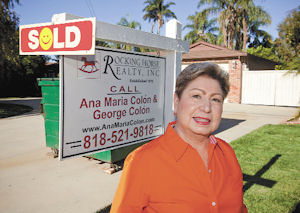The exodus of residential real estate professionals seems to be worsening. The difficult market has lingered longer than many had anticipated, and many financially strapped Realtors are hanging by their last thread. Some have picked up second jobs. If they’re young, many are moving back home with their parents. Others are leaving the business altogether. “A lot of people are leaving the business,” said Gina Uzunyan, a member of the board of directors of the Southland Regional Association of Realtors, a trade association for real estate professionals in the San Fernando and Santa Clarita valleys. Dwindling numbers of real estate agents, both young and old, tell the story of a difficult profession that, a few years ago, was booming with activity rewarding many with hefty commissions. “We’ve definitely noticed a drop in membership; some of our members are having trouble paying their dues.” Much has changed since the real estate boom lured many professionals into the industry at a time when selling a home was “easy,” according to Realtors. Those who are holding strong today are mostly representing banks in the sale of foreclosures, or have found a niche in the area of short sales, while also helping first-time home buyers compete for a very limited number of houses. “We’re working a lot more, double, triple the work, for a lot less money,” said Uzunyan, a realtor for more than 22 years who owns Koening Properties in Valley Village. Helping keep up the high level of work, Uzunyan’s company has diversified beyond the sale of homes and also works with multi-unit properties and commercial spaces. Ana Colon, who’s been called the godmother of real estate by many in a network of real estate professionals in the north San Fernando Valley, has never seen such severe market conditions. “I’ve never seen it this bad and nobody really knows how long it will last,” said Colon, owner of Rocking Horse Realty Inc., in San Fernando. With inventory at record lows in the areas of Sylmar, San Fernando, North Hills, Mission Hills, Northridge and Arleta among other areas where she represents clients, Colon is now having to compete with ten to 15 other offers on any given house. “There’s a lot of demand but very little supply so it requires a lot more work, tenfold the work, to find a property and try to compete with all the other offers. It’s frustrating,” she said. Inventory levels will likely worsen as some banks delay foreclosure processes until next year, she added. In a career that spans back to 1975, the former president of the Southland Regional Association of Realtors who has seen many fluctuations and shifts in the housing market, is now seeing a greater number of Realtors succumb to the market challenges. “It’s tough right now,” Colon said. Fellow colleagues are picking up second jobs, or are changing professions altogether, having been unable to successfully adapt to the current challenges. Adapting is key Realtors today are having to constantly adapt to a new and changing real estate environment. Due to the collapse of the housing bubble, a large number of people who bought homes between 2004 and 2007 in the San Fernando Valley and elsewhere are mostly underwater, and today a large portion of the inventory is comprised of distressed properties. “I would say about 70 percent of the inventory is short sales this year,” said Colon. Long gone are the days of no doc, low doc or stated income loans for borrowers who were not able to provide financial documentation to support their income. Most banks now require verification of income, assets and liabilities, and want to see pay slips and tax returns, before they will give the go-ahead on a home loan. This has all made accessing financing increasingly difficult and limited the pool of potential buyers. “For the most part people are having to come up with a down payment and Realtors have had to adapt with that change,” said Mel Wilson, broker and owner of an Altera Real Estate franchise in Northridge. Banks are now favoring government-backed loans to minimize their risk, said Wilson, and there’s been an increase in demand for FHA (Federal Housing Administration) loans where buyers can have down payments as low as 3.5 percent of the purchase price. Conventional bank loans require 10-20 percent down payment. All-cash deals “About 10-15 percent of all transactions right now are all-cash deals mostly from investors looking to fix and flip properties, but a handful of investors are also collecting rental income,” Wilson said. Among other changes, realtors have had to adapt and take advantage of the federal and state tax incentives for first-time home buyers, which boosted home sales during the previous quarters. Now they are having to adapt to the dip in sales caused by the expiration of those credits. “Those Realtors that are surviving through this are staying connected and informed, they are keeping up-to-date with the changes in the market, with technology, and are continuing their education,” said Colon. While her business is down, today Colon is holding strong also due in part to her longstanding reputation in a profession largely built through word of mouth and quality of service, she said. In today’s market, some believe it’s the more seasoned established real estate agents that are staying on top. “Deals are more complex now and people are looking for someone who’s a real professional,” said Carol Wolfe, an associate broker with Rodeo Realty, who specializes in luxury homes. High-end success Contrary to the wave of financial hardship hitting many in the industry, Wolfe, whose clients are mostly in Encino, is having her second-best year in the history of her 35-year career. There couldn’t be a better time for buyers as interest rates are at record lows, said Wolfe, and many still have equity on their properties.
